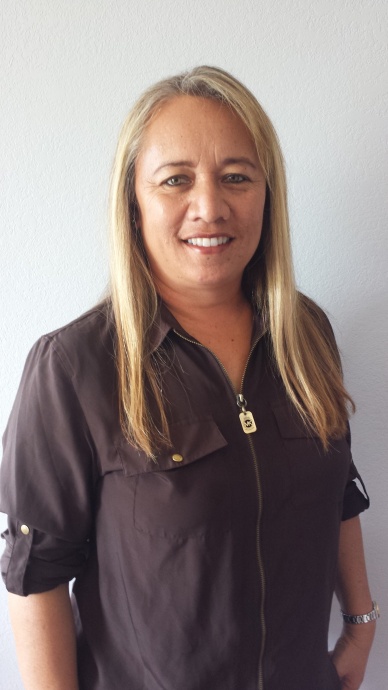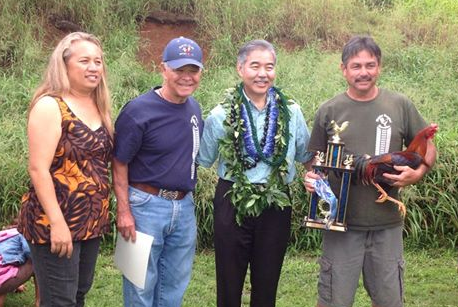Pro-GMO farmer to lead anti-GMO district
Lynn DeCroite, a Molokai farmer with ties to Monsanto, was sworn-in today to the state House to represent District 13, which voted in favor of the Maui GMO moratorium.
At noon on Friday, Febraury 20, Lynn DeCoite, co-owner of Molokai sweet potato operation L&R Farms, was sworn in to the Hawaii House of Representatives. DeCoite was appointed by Governor David Ige to complete the current term of the late Mele Carroll, who passed away on the morning of February 18.
DeCoite will represent District 13, which includes Haiku, Hana, Kaupo, Kipahulu, Nahiku and Paia on Maui, and the islands of Kahoolawe, Lanai, Molokai and Molokini. The ceremony was conducted by Hawaii Supreme Court Chief Justice Mark Recktenwald.
Gov. Ige’s other choices for the position were Lucienne de Naie, who had previously run for Maui County Council and won in District 13, and Lori Buchanan, popular Molokai activist who works for the Maui Invasive Species Committee. Instead, Gov. Ige chose DeCoite, who was appointed in 2012 by Gov. Neil Abercrombie to sit on the state Board of Agriculture.

According to the Star-Advertiser, DeCoite has ties to chemical company Monsanto’s Hawaii-based genetically modified seed industry assets. According to information provided by the Department of Hawaiian Home Lands in the article, “DeCoite is a third-generation farmer who, like other homestead farmers, grows corn for Monsanto… to support their operations.”
Anti-GMO group Babes Against Biotech (BAB) is crying foul over DeCoite’s appointment, however, after voters in Maui County approved a moratorium on all GMO-production until further health studies can be conducted last fall.
“We have been aware for some time that L&R Farms, owned by Mrs. DeCoite, is under contract with Monsanto to grow seed corn. Lynn herself confirmed this to our Maui Chapter Coordinator over an extensive phone conversation in March of last year; it is not something she is ashamed to admit,” wrote BAB in a letter to the committee that selected DeCoite as a finalist. “It is no secret that the GMO issue is a political hot bed on both county and state levels. We feel that nominating a GMO farmer to the position of State Representative, would be a political disaster and incite justifiable outrage.”
“Ige has gone from bad to worse,” said Maui-based blogger Karen Chun. “First he appoints corporate developer lobbyists to oversee the Department of Land and Natural Resources, and now he appoints a Monsanto GMO grower … to District 13—a district that voted 59 percent to 41 percent in favor of a GMO Moratorium. How much more corrupt can he get?”
“I was surprised and disappointed that the governor did not reach out to members of the community in his rush to appoint her,” said Bart Dame of Progressive Democrats of Hawaii. “The district overall voted in favor of the moratorium on GMOs, yet the Governor appointed someone who appears to be defined largely on the basis of her relationship with Monsanto.”
He added, “I work on a lot of issues and hope to find she is good on others.”
DeCoite is also a member of the Gamefowl Association, which believes cock-fighting to be a legitimate cultural practice that is being unjustly persecuted by groups like the Human Society. In 2010, the association attempted to get a resolution passed in the Hawaii Legislature celebrating cock-fighting as a cultural fixture. Gov. Ige has been pictured standing with members of the Gamefowl Association in apparent support.

DeCoite did not respond to inquiries from the Independent for comment. However, the Independent did access her application form for the District 13 seat, in which DeCoite answers a series of questions designed to gauge what kind of representative she would be:
1. Why do you want to be the Representative from District 13?
My roots stem deep into this community and over the years I have seen evolving changes and growth in our District 13. New policies and rules are being implemented by state and federal government at a rapid rate. I want to address these issues as your State Representative. Issues that we face in our district are drought, food gathering/security, emergency response programs, promotion and motivation of economic development for small and large business. Partnerships and collaborations play a major role in moving forward in any capacity. Yes, we have some major challenges, and we can accomplish and overcome many of these by working together. I am not afraid of hard work, and I am fully capable of representing this District based on my background and experience. I am committed to and passionate about our District. I will work hard for the people!
2. What do you hope to accomplish for District 13 with your skills and experiences?
Listen and address the people’s concerns by including everyone in District 13 to execute a plan of action. The skills I have gained as a business owner over the years, as well as the day to day demands of being self-employed have really allowed me to understand the values of hard work. As a farmer, I have gone through every aspect of planting something and nurturing it until it is fully developed and prospering. Farming has allowed me to learn how to give back to the community and has taught me to be compassionate toward others. My passion for the community drives me to support community projects and programs, such as the renovation of community facilities, housing projects, value added products, technology, and food/safety for farmers and agriculture as a whole. I continually meet with Hawaiian homestead leaders to promote new programs, and work on water issues.
3. What are the two most important issues facing District 13?
The lack of education in agriculture, and water are key issues for our District . Water is the most important factor for our food supply, construction of housing, and everyday living. Exploring ways of meeting water demand, initiating good agricultural practices, and finding partnerships to leverage funds is what we need to do. Working together with people who are successful in these areas is the expertise we will need to move us in the right direction. I will find partners who can work together regardless of the situation.
4. What is your knowledge and experience in safeguarding our natural resources (air, fresh water, ocean, native plants, fish, etc.)?
My knowledge and experience stems from family values. I was taught to take care or malama what we have. Do not use and abuse any of our rich resources our islands have to offer us. Providing education and awareness will lead us in the proper direction. Many organizations are providing much needed assistance and we should continue to support and partner with these organizations. We need to be consistent and utilize the tools provided in our everyday lives to protect our natural resources. Maintaining and supporting these efforts will make a difference in our communities. We can achieve sustainability. Preserving and respecting the old ways, by not taking more than we need from the ocean, and preservation of native plants and their natural environment, will leave resources for our future generations.
5. What are your ideas around achieving food independence in Hawai’i?
Number one is to make sure that we have an ample amount of water. Researching the financial impact of farming will help us discover the solution. A realization of rules and policies is necessary. Added costs to farmers must be subsidized. Accountability at the State level is needed in this area. Assist farmers in expanding their products and businesses. Provide funding for Agricultural extension agents, to support farmers. Provide funding for these positions. We need to identify successful farmers and recruit their resources. Implement agricultural programs in the schools. Mentor young and upcoming growers and farmers. Farmers and growers can provide all the necessary tools we need to achieve true food independence in District 13.
6. What are your ideas around economic development for District 13?
First and foremost is understanding our communities, our needs, and our aspirations. Evaluate and assess the past, observe the current, and prepare for the future. I will support our local businesses, and promote marketing for all businesses, with an emphasis on marketing Hawaii based products. WE need job creativity for District 13 that compliments the needs of our communities. I will work to streamline the State process and will draw interest from community members with the goal of creating interest in beginning new businesses. The challenge is to help the public wade through new rules and policies to cut through all the red tape.
7. What are your ideas to support renewable energy in District 13?
Renewable energy is the way energy goals must be reached. We must research new ways to create, develop and implement the newest energy technologies within our District. Renewable energy technology is a moving target. I will work with energy experts to make the environmentally appropriate choices for District 13. We need to explore renewables such as the installation and expansion of photovoltaic systems. Listen to and thoroughly investigate the possibilities that are constantly brought to the attention of the Legislature. We need to promote awareness and education of renewables and how they can work within our communities. It is important to listen to the public as we advance in our renewable technologies to insure that we strike a balance between technology and traditional ways of life. The exploration of ways to reduce the cost of energy to the consumer is imperative.
8. What are your ideas for implementing educational and social services in District 13?
We need to listen to teachers and administrators concerns. History has proven time and time again that we do not retain quality teachers due to the lack of adequate benefits and wages. We need to listen to the concerns of students and bring back programs to the schools that make students want to learn. Funding is a big issue for our educational system. Each school needs to have a grant writer on staff. Fund programs that assist students with SAT I ACT score preparation. Continue to provide preventive education to families’ in social service areas such as domestic violence, sexual assault and recovery programs.
